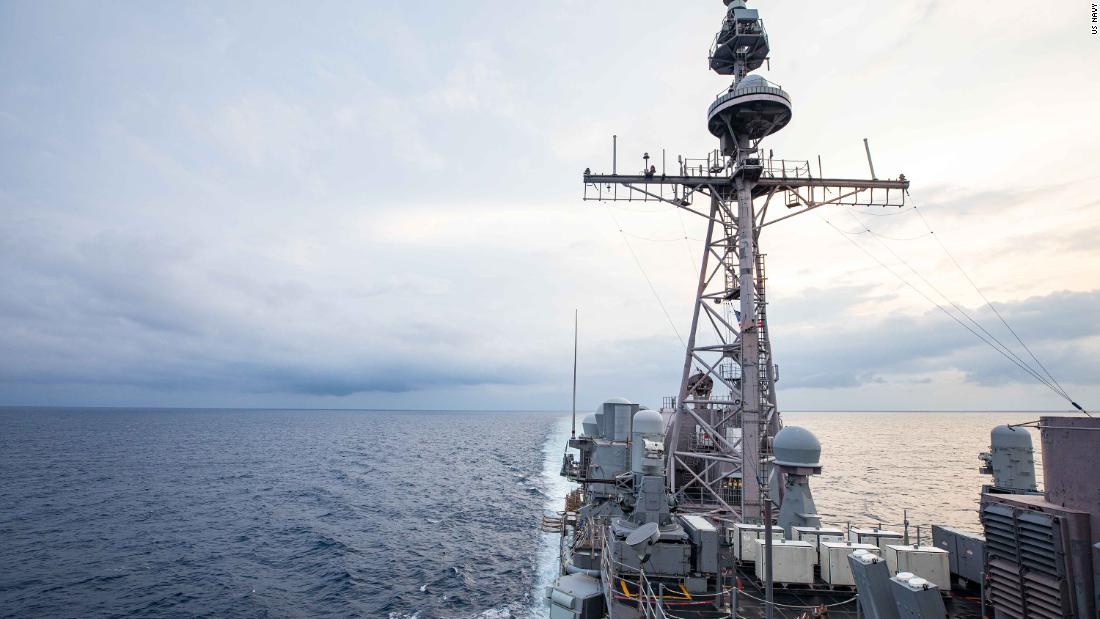
US officials, meanwhile, vowed Washington would stay the course and Chinese intimidation tactics would be challenged.
It was the first time in at least four years the US Navy had sent two cruisers through the strait, said Collin Koh, research fellow at the S. Rajaratnam School of International Studies in Singapore, who has been keeping a database on the transits.
“Having two instead of the usual one vessel to do this mission is certainly a ‘bigger’ signal of protest against not only Beijing’s recent military exercises around Taiwan following the Pelosi visit, but also in response to Beijing’s attempt to subvert the legal status of the waterway and the longstanding freedom of navigation rights through the area,” Koh said.
That the US warships made the transit Sunday was no surprise. They have made dozens of such voyages in recent years, and US officials had said transits would continue.
What was surprising to analysts was the muted response from Beijing.
The Chinese military’s Eastern Theater Command said it monitored the two ships, maintained a high alert and was “ready to thwart any provocation.”
Even the state-run Global Times tabloid, known for its often jingoistic and staunchly nationalist editorials, said the presence of the two cruisers brought “no actual threat to China’s security.”
While earlier this month, the Chinese ambassador to Washington, Qin Gang, called on the US to halt naval transits, saying they intensify tensions and embolden “Taiwan independence separatist forces.”
“If there’s any move damaging China’s territorial integrity and sovereignty, China will respond,” Qin told reporters in Washington in response to a question on possible upcoming transits.
Koh, the analyst, noted Beijing’s comparatively tame statements Sunday.
“Why didn’t the Chinese go beyond that given their earlier strong opposition to Washington’s professed intent to continue such transits?” he said, offering three possible factors.
Firstly, Beijing may be wary of “international blowback,” as any attempt to curtail US Navy navigation through the strait could be seen as threatening the rights of vessels from other nations to go through the waterway.
Secondly, after the Pelosi visit to Taiwan, Beijing suspended key military communications channels with Washington, raising the risk of misunderstandings during any PLA Navy-US Navy interaction.
Thirdly, there are other areas where Washington and Beijing do cooperate, and China may not want to strain those, Koh said.
“It doesn’t make sense to provoke further heightened tensions that can potentially escalate into a clash,” he said.
Carl Schuster, a former director of operations at the US Pacific Command’s Joint Intelligence Center in Hawaii, suggests a fourth possibility.
“I think (Chinese leader Xi Jinping) is going to avoid any action that might strengthen the Republicans’ and other China hawks’ chances in the upcoming elections. He doesn’t want a House and Senate that may enact legislation that more strongly supports Taiwan, or limits Chinese investment and influence in the US,” Schuster said.
Meanwhile, he said, the use of two cruisers in the latest strait transit might not be seen so much as a statement, but as reasonable military planning.
“Given China’s threats and recent missile firings into international waters … it does seem prudent to have two warships transit those waters together,” Schuster said.
And expect the US Navy to go about business as usual with regular transits of the strait, he said.
“Under international law it is international waters and so there is no official dispute on its status,” he said. “The US Navy transit makes that statement quietly and effectively.”
This story has been updated with additional information regarding China’s claims to the Taiwan Strait.
